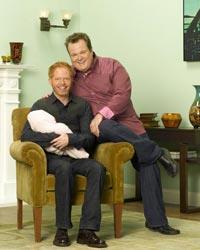[Our newest TVWW contributor, Barry Garron, is a veteran TV critic who has written for, among others, The Hollywood Reporter, Variety, and TV Guide. His first post for us asks a tough question: Why have TV entertainment shows seemed to aid gay rights, but not a woman's right to choose? - DB]
Why are some social values embraced quickly while others struggle for decades to gain a footing? There likely are many reasons, but I suspect an important one has to do with the persuasive power of television.
Consider two issues: same-sex marriage and a woman's absolute right to a legal abortion. Both lacked the support of a majority of Americans through most of the Twentieth Century.
The right to a legal abortion got constitutional footing when the Supreme Court decided Roe v. Wade in 1973. It would seem reasonable that, 40 years later, this would be considered settled. Instead, the issue is back before the U.S. Supreme Court in several forms. Abortion opponents have lost none of their fervor.
Buoyed by recent polls that show declining support for an absolute right to abortion, pro-lifers have redoubled their efforts. In the last few years, legislatures in Red States have passed a tsunami of new laws to restrict abortions and punish providers.
Now consider same sex marriage. Up until just a few years ago, it was illegal in every state. The federal government denied same-sex spouses the benefits given to other couples until only last year, after the Supreme Court ruled against the Defense of Marriage Act.
Now same sex marriage is available in about three-fourths of all states and the District of Columbia. There is huge momentum for change. Polls reveal significant shifts in public opinion over just a few years. Indeed, many of the most ardent opponents have conceded the issue, and moved on to champion other values issues. There seems little doubt that, in a decade, the prohibitions against gay marriage will seem as anachronistic as those that once prevented women from voting.
So why has one social change been embraced so quickly, while the other finds itself locked in an endless struggle?
In large measure, it may have to do with how the two issues have been portrayed in television, the most powerful, influential and ubiquitous medium of our time.
Since the 1950s, TV has not only reflected what is acceptable in the mainstream, but paved the way for progressive visions of social justice and individuality. Time and again, characters on TV, by virtue of their numbers and personalities, have torn apart negative stereotypes and moved viewers towards social tolerance.
 Although there is a danger in thinking of TV, with its multitude of networks and voices, as monolithic, there is nonetheless a sameness in the way producers and executives have approached these issues.
Although there is a danger in thinking of TV, with its multitude of networks and voices, as monolithic, there is nonetheless a sameness in the way producers and executives have approached these issues.
A series with gay characters was daring in 1984, when Showtime put on Brothers. But the gradual appearance of more and more gay characters paved the way for a relatively non-controversial premiere of NBC's Will and Grace in 1998. By the time Modern Family (right) began airing on ABC in 2010, there was widespread acceptance of gay couple Cameron and Mitchell and their adoption of a baby girl.
Meanwhile, celebrities who might have hidden their sexual orientation in the past were publicly embracing it. How awful could homosexuality be when some of the nicest people on TV -- Ellen DeGeneres, Anderson Cooper, Neil Patrick Harris and so many more -- were gay?
Viewers came to accept the concept of gay rights as an obvious extension of human rights. TV images, broadcast over and over, effectively neutralized the centuries-old arguments that gay marriage was a giant step toward moral decay and the decline of civilization. TV effectively rebutted the moral indignation and condemnation to which gays had been subjected.
 But even as TV bravely created a world that respected gays as individuals, it cowered from the idea of expressing support for a woman's right to choose a safe and legal abortion.
But even as TV bravely created a world that respected gays as individuals, it cowered from the idea of expressing support for a woman's right to choose a safe and legal abortion.
In 1972, on Norman Lear's All in the Family spinoff sitcom Maude, the title character publicly chose abortion in an infamous story line broadcast two months before Roe v. Wade. [NOTE: Maude: The Complete Series was released on DVD last month by Shout! Factory, and can be purchased here.]
In the 43 years since then, I cannot recall a single instance in which a regular series TV character dealt with an unintended pregnancy in that manner or, for that matter, even discussed abortion as an option. Meanwhile, hundreds of thousands of American women exercised their right to legal abortions every year.
In the pilot of Reba, broadcast in 2001, Reba's older daughter, Cheyenne, is unexpectedly pregnant. There is not a single reference to abortion as an option. Nor was it mentioned 12 years later, in the second episode of the new CBS sitcom Mom, when the teenage daughter of the character played by Anna Faris revealed she had become pregnant unintentionally. Neither character was prepared for parenthood, but the implication in both series was that the young women would be less than human if they failed to carry their babies to full term.
This season on CW, the title character of Jane the Virgin (right) got pregnant unintentionally, but never seriously considered having an abortion.
No wonder, then, that society has retreated on a woman's constitutional right to an abortion. On TV, the only acceptable choices seem to be having the baby or giving it up for adoption. From the perspective of networks and producers, it is as if Roe v. Wade happened in some parallel universe or not at all.
Do networks and producers lack the courage to stand up for women's rights? Is the industry without any women who had to face unwanted pregnancies? Whatever the reason, TV consistently fails to show a world in which legal abortion is an option, and TV viewers are never challenged to drop their preconceived ideas.
That's not only a shame. It has put an undue moral burden on women exercising their constitutional rights. Had TV made even a fraction of the effort to depict the right to a safe and legal abortion as being within the mainstream, there likely would be less support for initiatives around the country aimed at curtailing and eventually eliminating the hard-fought right to control one's own body.
It's even possible that a few brave doctors might still be alive.